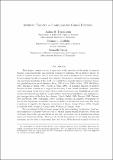Intuitive Theories as Grammars for Causal Inference
Author(s)
Tenenbaum, Joshua B.; Griffiths, Thomas L.; Niyogi, Sourabh
DownloadSubmitted version (253.0Kb)
Terms of use
Metadata
Show full item recordAbstract
© 2007 by Alison Gopnik and Laura Schulz. All rights reserved. This chapter presents a framework for understanding the structure, function, and acquisition of causal theories from a rational computational perspective. Using a "reverse engineering" approach, it considers the computational problems that intuitive theories help to solve, focusing on their role in learning and reasoning about causal systems, and then using Bayesian statistics to describe the ideal solutions to these problems. The resulting framework highlights an analogy between causal theories and linguistic grammars: just as grammars generate sentences and guide inferences about their interpretation, causal theories specify a generative process for events, and guide causal inference.
Date issued
2010-04Department
Massachusetts Institute of Technology. Department of Brain and Cognitive Sciences; Massachusetts Institute of Technology. Department of Electrical Engineering and Computer SciencePublisher
Oxford University Press
Citation
Tenenbaum, Joshua B., Griffiths, Thomas L. and Niyogi, Sourabh. 2010. "Intuitive Theories as Grammars for Causal Inference."
Version: Original manuscript